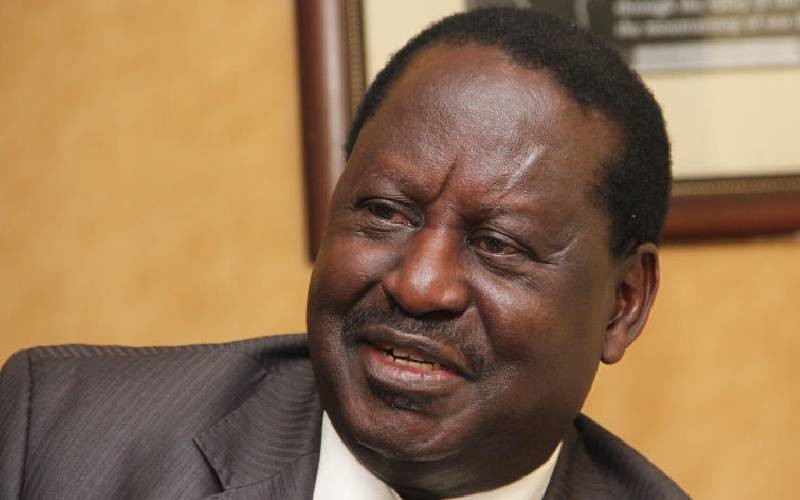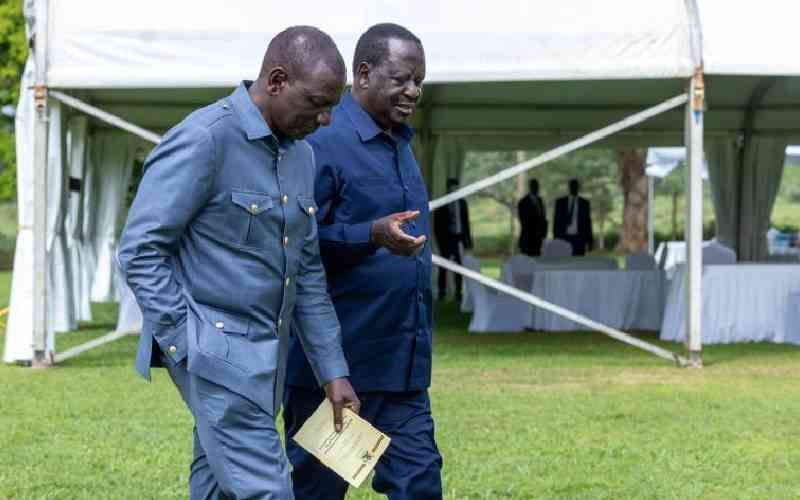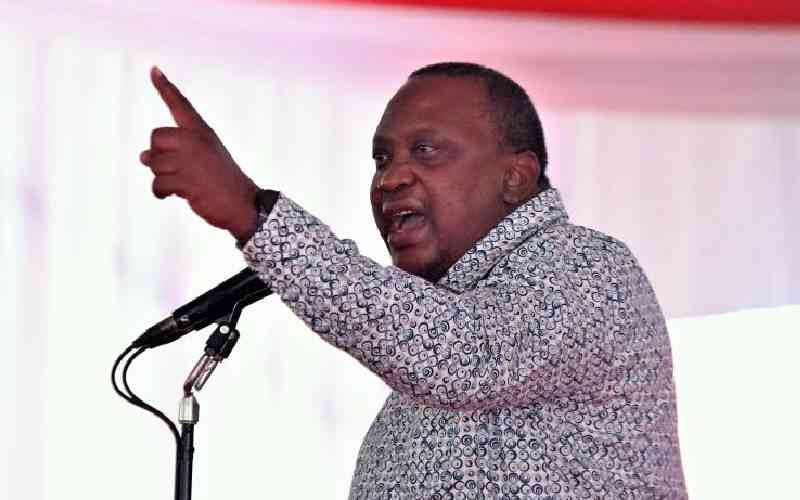
In the realm of politics, the elusive win-win scenario rarely materialises, with winners and losers populating life's course.
Yet, the current landscape in Kenya appears poised to grant President William Ruto a clear path in 2027 and position former Prime Minister Raila Odinga as Chairperson (or Jakom) of the African Union Commission (AUC) in 2025.
The inquiry at hand delves into whether Raila's candidacy stands a chance of success and how his departure might reverberate across Kenya's political spectrum. Can Raila effectively straddle both the African stage and domestic politics? Are we witnessing the twilight of an era?
Raila's political journey has been delineated by three distinct phases. Initially, he honed his skills in socialist-oriented ideology and politics during his student years in East Germany from 1962 to 1970.
Upon returning to Kenya and following a brief stint in public service and academia at the University of Nairobi, Raila embraced a second phase characterised by his role as a radical political activist, vehemently opposing Moi's authoritarian regime, which led to his detention without trial for approximately eight years.
During this period, Raila emerged as a pivotal figure in Kenya's opposition politics, advocating with others for the country's transition to multi-party democracy. He also became the face of the campaign for the 2010 Constitution, notably during the Bomas negotiations.
As a Member of Parliament, he consistently mobilised demonstrators to support civil society and faith-based people-driven constitution-making actors such as the National Convention Assembly/National Convention Executive Council (NCA/NCEC). Following the 1997 General Election, Raila adopted a third approach, forging rapprochement through his National Development Party (NDP) with former arch-rival President Moi. This marked the beginning of a series of cooperative relationships with President Kibaki (2008-2012), President Kenyatta (2019-2022), and now President Ruto.
Interestingly, despite Raila's propensity for controversial "handshakes" following staunch opposition to incumbent regimes, both the Kenyan media and populace have consistently extended clemency towards him, lauding him as the opposition linchpin, architect of Kenya's reform movement, and champion of devolution.
The celestial alignment appears to favour Raila's bid for the leadership of the AUC, with the Eastern African region's turn now at hand. Raila's timely declaration of candidacy as well as Ruto's swift endorsement may prompt other potential contestants to shy from the ring, especially considering President Kenyatta's withdrawal.
Raila has wasted no time in rallying support, initially within the East African Community (EAC), before extending his efforts to other Eastern African countries and eventually across the entire continent.
Kenya's prior experience holding the Deputy Chairperson position at the AUC, through Erastus Mwencha, coupled with a prospective rotational formula aimed at preventing any single country from monopolising senior AUC positions, impedes support for Raila's candidacy.
Moreover, Ruto's endorsement could pose challenges, as some African leaders harbour reservations about the President's ambitions for continental influence, particularly concerning his climate change advocacy and recent assumption of Africa's institutional reform mandate. Ruto's courting of the West largely outside the AU orbit seems to attract sibling rivalry among some African leaders.

Nonetheless, Raila's extensive experience and relationships across Africa, including his advisory role in relation to the AU infrastructure sector and his decades-long political career, position him favourably in his quest.
At 79, Raila presents himself as a seasoned statesman, having transitioned from his radical youth demeanour to a more moderate and diplomatic temperament. His Pan-Africanist ideology, coupled with his diverse background in politics, business, and international relations, arguably renders him a compelling choice. Raila's multilingual aptitude, including familiarity with Russian and Chinese ideologies and diplomacy, are added advantage to his candidacy.
Let us now examine the foreseeable ramifications of Raila's departure from Kenyan politics. Many within the Azimio-One Kenya coalition might have been caught off-guard by Raila's sudden alignment with Ruto, but such decisive manoeuvres are characteristic of Raila's modus operandi. Once he makes a significant decision, he swiftly executes it, expecting his collaborators to catch up. Just as when he decided to engage in a handshake with Uhuru, other Azimio principals were informed on the announcement day itself, with the details of the agreement already finalised.
As expected, Azimio finds itself in a state of shock upon realising that its leader has veered off course in search of new opportunities. Can ODM, Wiper Democratic Movement Party, Jubilee, NARC Kenya, Democratic Action Party-Kenya (DAP-K), and other affiliates produce a leader capable of maintaining the coalition's unity up to the 2027 General Election and beyond? Alternatively, could the coalition opt for a collective leadership approach rather than relying on a single leader?
Is there a concerted effort to isolate Jubilee from the coalition, possibly benefiting the president's objective of retaining the restive Mount Kenya voting bloc? Some politicians from Mount Kenya, such as Martha Karua and Jeremiah Kioni, have distanced themselves from the National Dialogue Committee (NADCO) report, which appears to have laid the groundwork for the Ruto-Raila union.
A 'Kamwene Caucus' is being crafted by a coterie of Mount Kenya politicians to safeguard the community's interests, potentially leading to fractures within Azimio and the formation of new alliances. Some analysts are already anticipating the emergence of a new coalition led primarily by figures from Rift Valley, Nyanza, Western and North Eastern regions.
Who might then succeed Raila? Names like Wycliffe Oparanya, Opiyo Wandayi, Fred Matiang'i, Jimi Wanjigi, Hassan Joho, and Mwangi wa Iria are being floated. Kalonzo Musyoka has been challenged by key ODM operatives to demonstrate his ability to mobilise beyond Ukambani if he wishes to inherit Raila's support base.
Should the President dispatch Raila to the AUC and subsequently inherit his political backing, the remnant Azimio faction could become a weakened contender for the presidency amidst the prevailing tribal politics.
As Emmanuel Katongole (2022:73) poignantly observes: '(T)he appeal to ethnicity as a "natural" identity not only is misleading but becomes a dangerous myth. The appeal to "tribal unity" easily plays an ideological role that continues to blind us to the economic and political interests that often cut across 'tribal' lines.
Thus as Appiah notes "'Race' in Europe and 'tribe' in Africa are central to the way in which the objective interests of the worst-off are distorted". Will Raila's and his associates' prestige be diminished due to their collaboration with Ruto? Conversely, could Ruto be fortified by such cooperation? The answer to both questions appears affirmative. Undoubtedly, if Raila pulls off the AUC chairpersonship, he will flourish in his sunset years.

Kenyatta may endeavour to initiate a proxy Uhuru-Kalonzo-Karua coalition, aiming to counter the Ruto-Raila formation in 2027. Can this Azimio faction coalesce into a formidable opposition? Only time will provide the answer. Raila's unforeseen upheaval has indeed unsettled Azimio and Kenya's opposition politics.
There is no telling if the political earthquake could also, especially in the short term, ruffle Kenya Kwanza.
Kalonzo is already asserting his claim to leadership within Azimio and positioning himself as the presidential flag bearer for 2027. If Raila has indeed fully aligned himself with Ruto, it is plausible that his supporters will rally behind the new coalition partner going forward, following the principle of reciprocity. Consequently, Kalonzo may find himself abandoned as ODM blazes a new trail.
In such a scenario, Kalonzo would have to decide whether to join Raila in Ruto's Kenya Kwanza coalition or run for the presidency independently. However, the former vice president's chances of success would be slim, given the calculated isolation orchestrated against him.
Is there a necessity to enact the NADCO recommendation to establish an official opposition? My answer is in the negative. The president appears to have effectively neutered the opposition. Who would be a credible occupant of such an office today?
While Raila has pledged to remain active in Kenyan politics even after assuming the AUC position, this assurance may simply be a gesture to placate his supporters. Any interference by the AUC chair in the internal politics of any of the 54 member countries will, once petitioned, predictably provoke a backlash from the AU Summit.
In the event Raila fails to secure the AUC chair, his return to Kenyan politics would be fraught with challenges. Some lawmakers are likely to accuse him of opportunism, potentially diminishing his prospects for success in the 2027 elections if he vied. Speculating further, the possibility of Raila occupying the AUC chair until 2027 and then resigning to contest Kenya's presidency appears remote. It is my belief that Raila's absence from the political scene will pave the way for a reconfiguration of Kenyan politics, possibly prompting the resurgence of a reformist movement committed to vanquishing tribal identity politics, addressing youth disempowerment, tackling socio-economic underdevelopment in earnest, and upholding the 2010 constitution and devolution. However, if this fails to materialise, the existing disjointed political opposition will limp along until 2027 only to face a decisive defeat in the ensuing ballot.
 The Standard Group Plc is a multi-media organization with investments in media
platforms spanning newspaper print
operations, television, radio broadcasting, digital and online services. The
Standard Group is recognized as a
leading multi-media house in Kenya with a key influence in matters of national and
international interest.
The Standard Group Plc is a multi-media organization with investments in media
platforms spanning newspaper print
operations, television, radio broadcasting, digital and online services. The
Standard Group is recognized as a
leading multi-media house in Kenya with a key influence in matters of national and
international interest.



